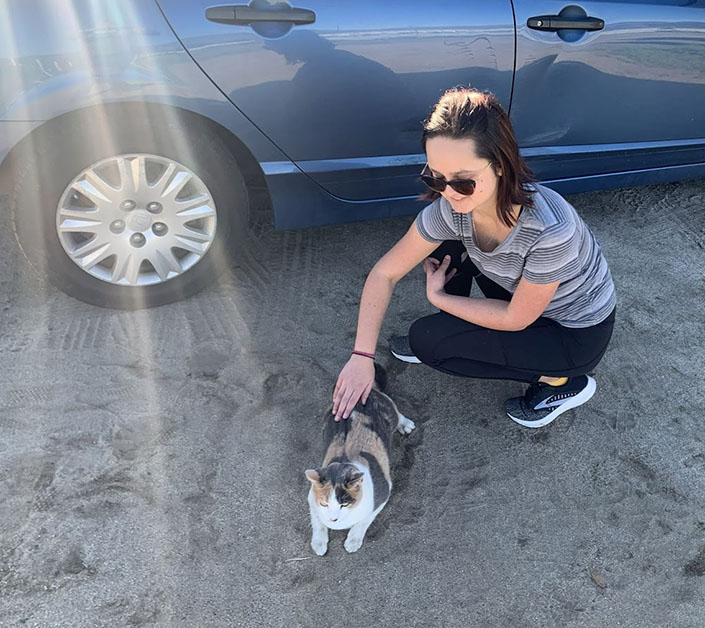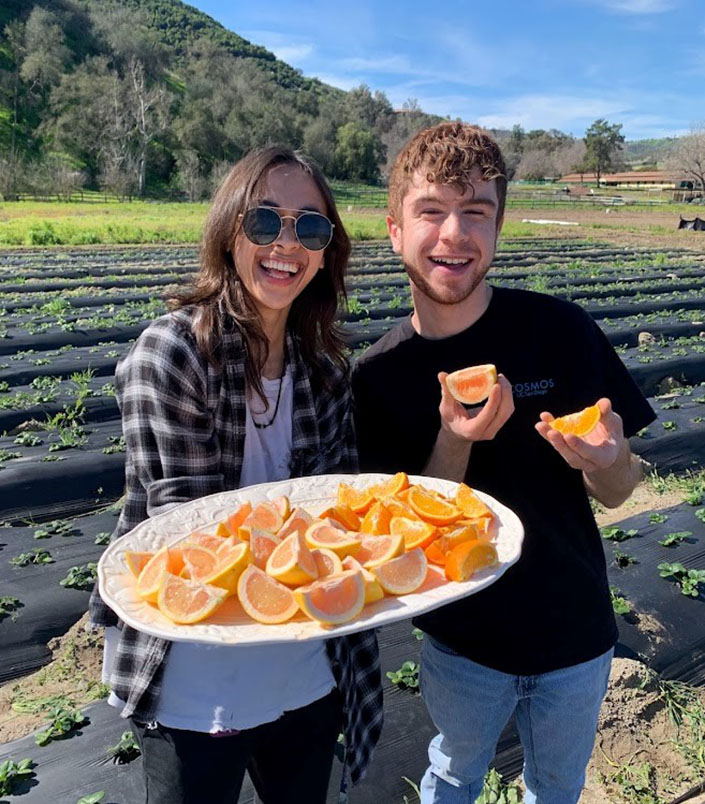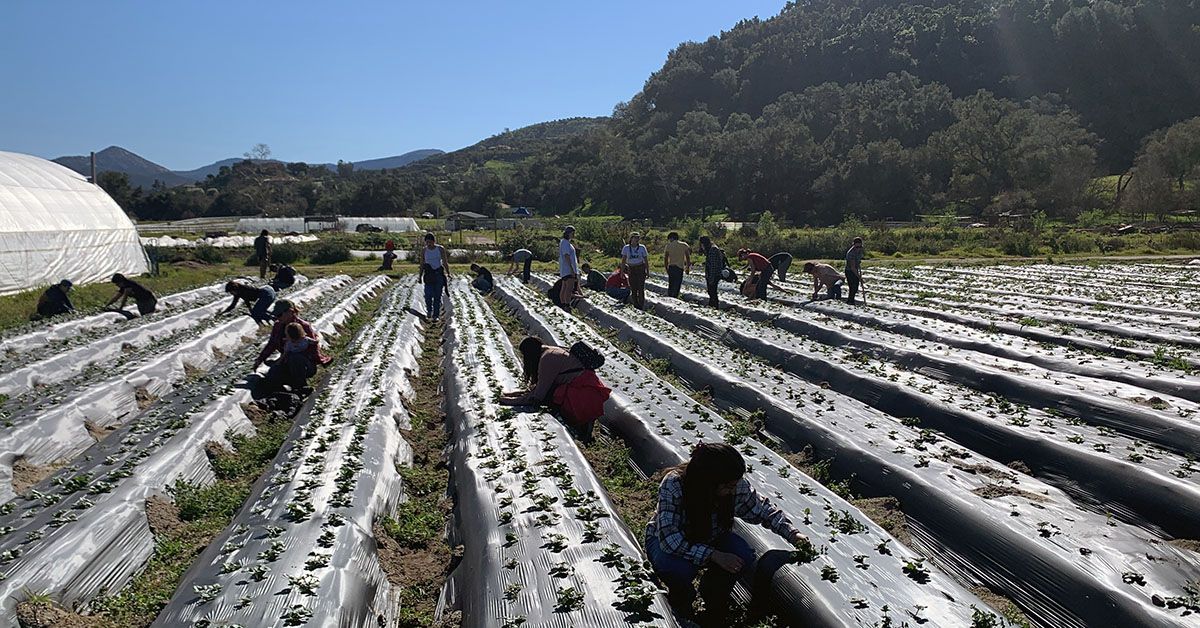Confessions of a Fainthearted Student Farmer: Strawberry Fields Forever
Published Date
Story by:
Media contact:
Topics covered:
Share This:
Article Content
I have always been a bookish kind of learner. I love poring over essays to extract arguments, and I relish puzzling over maps and diagrams. When there’s a skill I’d like to learn, I study up on the background and dissect techniques I find in a book before I ever give the actual skill a try – I can't just plunge in without knowing the context.
When I heard about a project-based, community-oriented experiential learning class centered on climate justice, I was immediately put off, if still curious. The content intrigued me. Focused on how the climate crisis intersects with justice, health, equity, wellbeing and culture, the course aligned well with my passions and area of study.
Still, it was the course’s deeply interactive nature that gave me pause. Was I really prepared to devote my Fridays – and some Saturdays – to community outings and research trips, to scratch my mental health if the group projects went sideways and to commit to the time and energy required to succeed in a 6-unit class? I wasn’t sure, and that scared me.
Naturally, I enrolled. My curiosity got the better of me, and I joined the 2023 cohort of the Climate Justice Action Resilience Scholars (CJARS). Created and taught by UC San Diego doctoral alum Leslie Lewis, CJARS is offered through the departments of Anthropology and Urban Studies and Planning. I knew the interdisciplinary, intense course would challenge me. But, in truth, I didn’t know what lay ahead.
Working in the dirt under the hot Escondido sun was not what I thought I’d be doing. Did I have a clear idea in mind of what I expected when I enrolled? No, not really. Somehow, I was still surprised to find myself dusty, slightly sunburnt and blistered after a few hours hoeing beds of strawberries on a February morning.
We were just starting our longest outing of the quarter, which included a trip to Solidarity Farm in Pauma Valley, followed by several activities at the San Pasqual Reservation, including an Indigenous medicinal plant workshop with Paul Cannon, a studio tour, lecture and dinner with Kumeyaay artists and activists Johnny Bear Contreras and Juan Angel Reynoso and a CJARS campfire bonding session at the end of the day.

Solidarity Farm is a cooperative family farm that borrows land owned by the Pauma Band of Luiseno Indians. The 10-acre farm prioritizes regenerative agricultural practices that sequester carbon and build healthy soil in order to play a role in changing the current food system into one that is more equitable, sustainable and just.
After carpooling to Solidarity Farm and meeting the lovely farm cat and dogs, we were shown the ropes by farm founder Hernan Cavazos and put to work in the fields. Together, we spent about two hours working in Solidarity’s strawberry beds. Those with good knees squatted or knelt near the ground to tease out rascally weeds from between strawberry leaves. Others, like me, were on hoeing duty and worked the land between the beds to rid them of weeds and stones.
"Go get your hands dirty – you’ll learn something."

While it may sound simple, the rapid repetitive motion and the midday sun quickly left us aching, tired and perhaps a little grouchy. A gift of fresh-grown citrus slices was one of the best I’ve ever received; cool grapefruit juice sliding down your throat does wonders for a parched, sun-battered soul.
Much to my grandfather’s chagrin, I never wanted to be a farmer like him. That Friday at Solidarity Farm made me discover I am definitely not cut out for it either – I’m too afraid of bees to succeed at farm life.
Even so, I deeply value the time we spent getting our hands dirty at the farm. While I may not have found a new career path, I came away with a newfound respect for just how hardworking and resilient someone must be to succeed as a farmer. And, I learned a new skill that suburban-born me had never had the chance to try.
It sounds like a small, insignificant thing: digging, working the earth, giving strawberries an easier path to follow. Yet, that act of reciprocity – I’ll help you thrive, you’ll bear sweet fruit, and we’ll both be better because of it – meant more to me than I expected.
Reciprocity, interconnectedness and creating, healing and furthering individual and cultural relationships to the land are common topics in my coursework. As an Anthropology: Climate Change and Human Solutions major, I study the interactions between culture, climate change, human action, social justice and the systems that create our world. I love it; I enjoy studying theory and learning ways to apply it.
For me, hoeing strawberry beds at Solidarity Farm was a sort of putting theory into practice. It’s all well and good to advocate for reciprocal relationships with the land instead of exploitative ones, but it takes on a new meaning when you are the one intervening and creating that reciprocity, even on such a small scale. Naively, I wasn’t expecting that.
I have to wonder when (if ever) I would have felt the value of that reciprocity if not for our visit to Solidarity Farm. On the way home from our outing, I found myself a bit shocked to realize that I’d learned something that day, and I’d learned it without studying a single word. Yes, I’d learned proper hoeing techniques, but I’d also come away with a deeper understanding of reciprocity. I finally understood what my mom meant when she said that manual labor teaches you lessons.
All jokes aside, that type of experiential learning was something I’d never encountered before. It fascinated me, especially as a social sciences and humanities student. As much as I love theory and conceptual knowledge, this was different. It seemed a natural follow-up to learning from books. Yes, it frustrated and exhausted me; yes, I still value the lesson I took away from it.
While I probably won’t be taking another experiential learning-based course before my time as an undergrad at UC San Diego comes to an end in June, I can easily say that the chance to put theory into practice has been an extremely valuable opportunity. Go get your hands dirty – you’ll learn something.
Stay in the Know
Keep up with all the latest from UC San Diego. Subscribe to the newsletter today.




